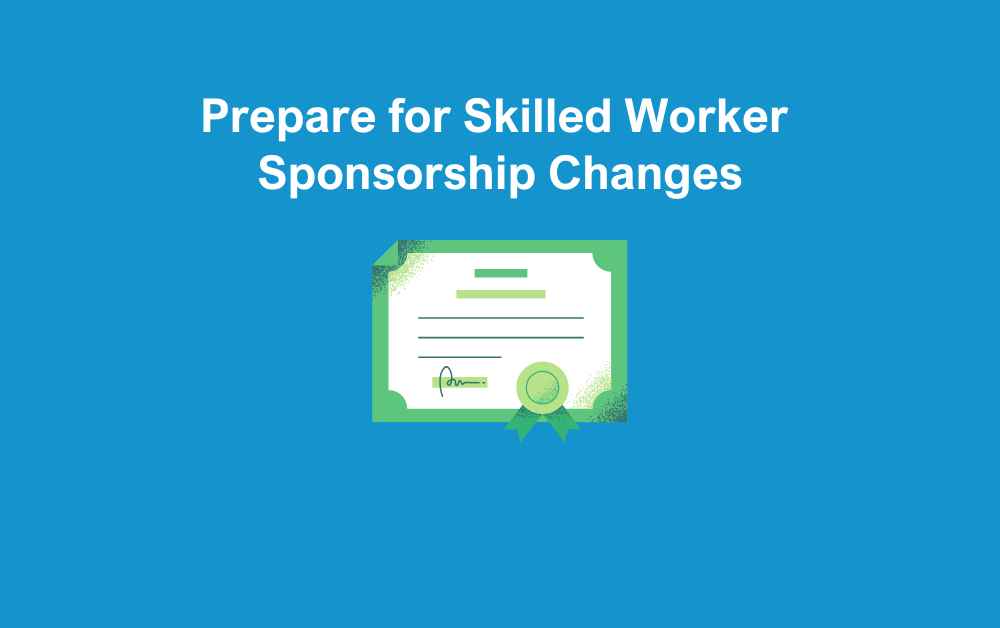At the start of the month, the Government announced significant updates to the Skilled Worker sponsorship route, putting into motion several key proposals from its earlier Immigration White Paper.
These changes are due to take effect on 22 July 2025, leaving businesses with limited time to prepare. It’s essential to take action now to ensure you meet the new requirements in good time.
In this blog post, we outline the full list of changes you need to be aware of.
Skilled Workers salary
As set out in the Immigration White Paper, Skilled Worker salary thresholds will rise from 22 July. The general salary threshold will increase from £38,700 to £41,700. The going rates for individual roles will also go up. Different salary levels will apply to those eligible for new entrant or other permitted discounts, as well as to workers who were sponsored before 4 April 2024.
Skilled Worker Sponsorship skills thresholds
Along with salary changes, the Government has also taken the decision to raise the minimum skill level when sponsoring new skilled workers. This means that only roles at level RQF6 (degree-level in terms of skillset, rather than academic qualification). Therefore, from 22nd of this month, 111 roles will no longer be considered
This means that from 22 July, 111 occupations will no longer be deemed Adequately qualified for a new skilled worker visa. This can include chef roles, dispensing opticians, vet nurse, and fitness instructors.
Workers already in the UK can still be sponsored. However, the UK Government has made it clear that this arrangement will not remain in place indefinitely.
Hiring of international care workers
From the 22nd, companies will no longer be able to recruit overseas care workers. This means care workers and senior care workers will be removed from the list of eligible roles for a skilled worker sponsorship.
Care workers already in the UK can continue to be sponsored up until 22 July 2028. Switching into a sponsored care worker role from another visa, such as the Graduate visa, will also remain possible until this date. However, the individual must have been employed by their sponsor for a minimum of 3 months before sponsorship can take place.
Bringing Family Members Over
The ability to bring family members will be limited. Workers sponsored in roles at RQF levels 3 to 5 will no longer be able to include dependent family members on their visas. This change does not affect those already on the route or those in roles at RQF level 6 and above.
Next Steps for Employers
Review salaries
Review the salaries of all employees with a skilled worker sponsorship. Employers should promptly assess the pay of both current and prospective sponsored employees to ensure they meet the new salary thresholds when their next visa application is submitted.
Review Skill Levels
Identify any existing sponsored workers who may be affected by the upcoming changes. This applies particularly to those in roles below RQF6 or in the care sector. Ensure that any necessary actions, such as visa extensions or role changes, are submitted before the deadline. If you would like support to find out if this is possible for your business, contact our HR experts.
Communicate with affected staff
Inform current and prospective employees about how these changes to skilled worker sponsorship may affect their visa status or eligibility. Clear communication now will help reduce uncertainty and support compliance.
Seek professional guidance if needed
If you’re unsure how these changes apply to your organisation, it’s wise to seek specialist advice. This will help you to avoid any risks of non-compliance.
By acting now, you can ensure your business remains compliant and continues to attract the talent it needs, despite a more restrictive immigration landscape.
How The HR Booth Can Help
Navigating immigration changes can be complex, and the latest updates add further pressure on employers. At The HR Booth, we work closely with businesses across the UK to ensure they stay compliant, informed, and ready for change.
We can support you with:
- Reviewing current skilled worker sponsorship arrangements
- Checking salary and job role compliance
- Providing guidance on visa applications and switching routes
- Supporting communication with affected staff
- Advising on dependent family member restrictions
- Helping you prepare for audits and Home Office checks
Whether you’re managing existing sponsored employees or planning future recruitment, we’re here to help you make informed decisions and stay ahead of these changes. You can find out more about our certificate of sponsorship service on or website.
Conclusion
The upcoming changes to the Skilled Worker route mark one of the most significant shifts in UK immigration policy in recent years. With the new rules taking effect from 22 July 2025, employers must act now. This will ensure you remain compliant and continue to attract and retain the talent you need. Don’t wait until it’s too late—review your current processes, seek advice where needed, and prepare your business for the new immigration landscape.
If you need support with Skilled Worker Sponsorship or would like to speak with our team, please get in touch.







